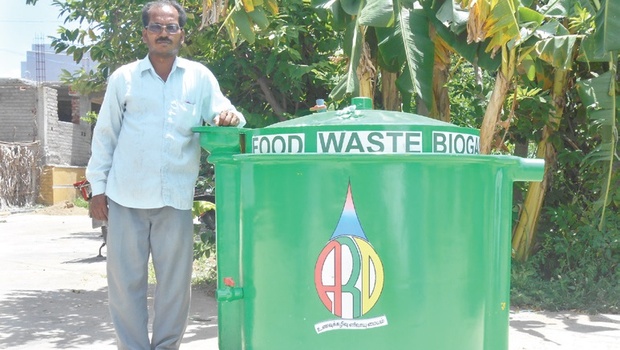
Chennai :
Three years ago Annadasan P was at a conference organised by the Ministry of Small and Medium-sized Enterprises (MSME) at Chennai. The event unveiled a slew of technological initiatives including those offering solutions to food-waste conversion. But as Annadasan recalls, they were all expensive and rather complicated solutions. Hailing from an agricultural area in Polur of Thiruvannamalai district, his insight into bio-waste management told him that these prototypes were lacking something. “They were not something a working man or woman have the time for. One had to manually mix the compost a dozen times a day,” says Annadasan.
Recently, Annadasan, was spotted manning a busy stall at the Global Investor’s Meet last week, flaunting his organic waste-to-energy converter- a fruit of 3 years of labour and research. The converter, a 10-litre capacity set-up produces up to 1 cubic output of Compressed Natural Gas (CNG) which can be tapped through a tube and used for cooking. That’s almost an hour of gas with your stove on high-flame for every half capacity of the drum.
“It is not run by any motors or batteries and is completely self-sufficient,” says Annadasan, who after months of saving water-drums and trying out new mixers, finished his product a few months ago.
What are the things that go into the converter? “Every kind of organic waste from food waste, leftovers, stock water to even animal wastes can be used in it. Cow dung is not favourable as it produces only 1 kilo methane for every 10 kilos of fuel, but the rest of them are compatible with the system,” he adds.
When City Express spoke to a couple of residents asking whether they will invest in one of these organic-converters, the replies were mostly bleak. “My biggest apprehension is the smell,” said Sureshkumar. Selvi V.S, a homemaker said, as she lives in a nuclear family, she does not see much use of an organic-converter in her household. “We can’t possibly load a machine with 6-7 kilos of waste everyday,” points out.
But Annadasan is ready with an answer for that as well. “During my two-and-half-years of research, I found the biggest problem was the maintenance of the set-up itself. Nobody has the time to be cleaning or checking. So with all these thoughts constantly running in my mind, I have designed this organic machine that has several mixers which will process the waste through a ‘water-jacket’ system that ensures that it doesn’t let out any kind of stench even after waste has accumulated in it for three to four days.
Currently a large amount of unsorted waste comes under organic matter. “We take inventories of food going waste, but at least 25-30 kilos of food is wasted during a single birthday party or wedding reception at a star-hotel,” says Ganesh*, who works at a prominent hotel in the city. A bulk of the food waste comes out of used plates. And though aimed at households, and smaller canteens these kind of products are also useful for industries.
Around 20 farmers among them would be selected and trained in organic farming periodically.
source: http://www.newindianexpress.com / The New Indian Express / Home> Cities> Chennai / by Amrutha Varshini / September 14th, 2015